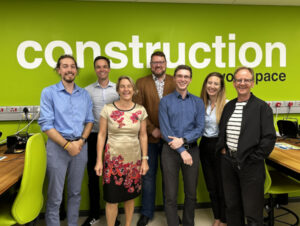In 2024, the EU Horizon 2020 funded PRODIGEES project showcased the impact of international collaboration in addressing the complexities of digitalisation and sustainable development. This year, researchers carried out 24 research exchanges (secondments) between emerging powers and Europe, solidifying PRODIGEES as a central hub for interdisciplinary and cross-border research.
International Research for Local and Global Challenges

PRODIGEES (Promoting Research on Digitalisation in Emerging Powers and Europe Towards Sustainable Development) researchers tackled diverse issues through research exchanges, creating comparative perspectives that connect local and global challenges. Instituto Mora’s Citlali Ayala and Isela Orihuela partnered with IDOS to explore the interplay between digitalisation and South-South cooperation on the one hand, and urban sustainability on the other. Regarding the latter, Isela Orihuela identified shared challenges in Mexico and Germany, such as bridging digital divides between rural and urban areas, integrating public services online, and aligning digital innovation with sustainable urban planning. Meanwhile, IDOS researcher, Franco Juaregi, explored digitalisation’s impact on urban mobility in a one month secondment to Indonesia. The findings demonstrate how digitalisation can drive inclusive urban transformation.
From IDOS, Dr Anita Breuer expanded her analysis of digital disinformation by focusing on Brazil, building on her earlier research in Mexico. Spending one month in Brazil, she investigated how digital platforms polarise societies and undermine democracy, offering critical insights to inform international policy recommendations. Also Eva Lynders and Vy Dang continued their investigations of digitalisation in connection to the G20/T20. After similar research in India last year, they implemented a secondment to FGV EBAPE in Rio de Janeiro.
In South Africa, Ingrid Schneider (University of Hamburg) advanced her comparative research on data protection regulations, continuing her work in Mexico, India, and Brazil. She examined how international frameworks influence local legislation and shaped the practical implementation of data governance. Her research identified opportunities for harmonisation while addressing existing gaps. Also four IDOS researchers, Dr Sven Grimm, Matthias Kachelmann, Dr Wulf Reiners and Benjamin Stewart, implemented research secondments to Stellenbosch University with different thematic foci, including the science-policy interface.
Collaborative Policy Labs and Conference in South Africa
PRODIGEES coordinator, IDOS, and partner Stellenbosch University, co-hosted Policy Labs in Stellenbosch and Cape Town, South Africa, which brought together experts from 14 institutions. Participants co-created policy solutions on ethical data governance, digital literacy, mitigating digitalisation’s environmental impacts, and aligning with the UN’s Global Digital Compact. Following a collaborative workshop design, the sessions successfully bridged academic expertise and practical policymaking.
Organised back-to-back to the Policy Labs, a joint Managing Global Governance (MGG) conference with the National School of Government of South Africa (NSG) focused on the interconnection of digitalisation and sustainable development with a particular view to capacity development in the civil service.
Ongoing Research Bridging Continents
PRODIGEES researchers continue to tackle digitalisation towards sustainable development from different perspectives. From South Africa, the University of Stellenbosch’s Leanne Seeliger is analysing digital incentives to improve water conservation in Khayamandi Township while comparing these efforts with water management strategies in Germany. Meanwhile, during his research secondment to IDOS, Rifqi Rachman, from the Centre for Strategic and International Studies in Jakarta, is analysing how digital archives preserve collective memory.
Transforming Research Into Actionable Insights
PRODIGEES researchers are translating their work into accessible and creative formats. Rafaela Cavalcanti de Alcântara, from the Austrian Academy of Sciences – Institute of Technology Assessment (OEAW-ITA) in Vienna, created the fanzine Inhabiting Body-territories, which vividly illustrates the intersections of data-driven urbanism and human embodiment.
You can find a full list of PRODIGEES publications, presentations, and digital knowledge products on the PRODIGEES website and download them from the PRODIGEES Zenodo repository.
Looking Ahead
As 2024 concludes, PRODIGEES is preparing for its Final Conference, hosted by Instituto Mora in Mexico City from 9–13 March 2025. The project, which began in January 2020, will officially end on 30 June 2025.

Schreibe einen Kommentar